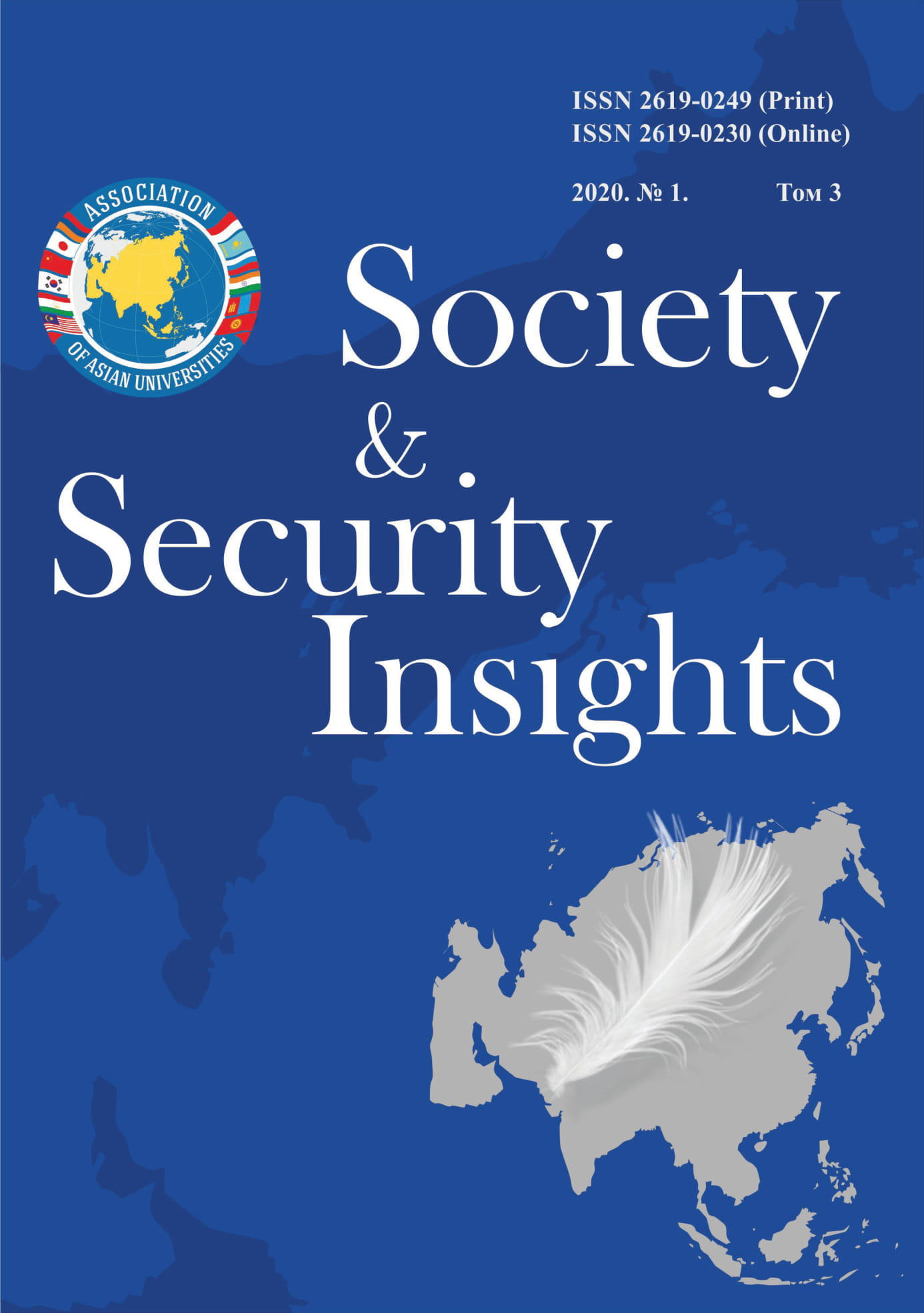FACTORS OF THE SUBJECTIVE FEELING OF SECURITY AMONG POPULATION (ON THE EXAMPLE OF THE ALTAI REGION)
Main Article Content
Abstract
The relevance of the topic stems from the increase of uncertainties and risks witnessed in the Russian regions during last decades. The scientific discourse is characterized by the lack of studies about factors and conditions, responsible for optimal level of security in society. The purpose of the research consisted in the revelation and the analysis of factors, determining the subjective feeling of security among population from the Altai region as one of the border regions of Russia. Based on the data of the sociological survey, conducted in 2019 in the Altai region (n = 621) and binary logistic regression method, the authors have found that the high satisfaction of population with the security of life, recreational activities, remuneration and material position, level of social solidarity, the male gender and high level of generalized trust increase the likelihood of formatting the sense of security. In contrast, the high level of education and satisfaction with situation in the country, possibilities of professional growth, self-realization, and residence in urban area are key factors decreasing the sense of security.
Downloads
Metrics
Article Details

This work is licensed under a Creative Commons Attribution 4.0 International License.
Authors retain the copyright of their manuscripts, and all Open Access articles are distributed under the terms of the Creative Commons Attribution License, which permits unrestricted use, distribution, and reproduction in any medium, provided that the original work is properly cited.
References
Гидденс Э. Судьба, риск и безопасность. THESIS, 1994, No. 6), 4–102.
Кузнецов В.Н. Социология безопасности: формирование культуры безопасности в трансформирующемся обществе. Приложение журналу «Безопасность Евразии». М., 2002.
Луман Н. Социальные системы. Очерк общей теории. СПб., 2007.
Луман Н. Власть. М., 2001.
Омельченко Д.А., Максимова С.Г., Ноянзина О.Е. Генерализованное (обобщенное) доверие в российских приграничных регионах как показатель социальной безопасности. Society and Security Insights, 2018, 1 (2), 11–28.
Серебрянников В., Хлопьев А. Социальная безопасность России. М., 1996.
Силласте Г.Г. Новая наркоситуация в России: угроза безопасности общества и личности. М.: Орбита-М, 2003.
Фукуяма Ф. Доверие. Социальные добродетели и созидание благосостояния. В кн.: Новая постиндустриальная волна на Западе: Антология. М., 1999.
Яницкий О.Н. Социология риска: ключевые идеи. Мир России, 2003, No 1, 3–35.
Яновский Р.Г. Глобальные изменения и социальная безопасность. М., 1999.
Hentz J.J. National and Human Security in Sub-Sahara Africa. Orbis, 2010, 54 (4), 630–643.
King G. and Murray C.G.L. Rethinking Human Security. Political Sci-ence Quarterly, 2001–2002, 116 (4), 58–610.
Krause K. Towards a Practical Human Security Agenda. Geneva Centre for the Democratic Control of Armed Forces, Policy Paper, 2007, No 26.
McCormack T. The limits to emancipation in the human security framework. In: Chandler D. and Hynek N. (eds) Critical Perspectives on Human Security, London: Routledge, 2011, рр. 99–113.
REFERENCES
Alehnovich, S.O. (2001). Mehanizmy realizacii regional'noj bezopasnosti v paradigme federativnogo gosudarstva [Mechanisms of regional security in the federative state paradigm ] (PhD Thesis). M.
Giddens, Je. (1994). Sud'ba, risk i bezopasnost' [Fate, risk and security]. THESIS, no 6, 40-102.
Kuznecov, V.N. (2002). Sociologija bezopasnosti: formirovanie kul'tury bezopasnosti v transformirujushhemsja obshhestve [Sociology of security in the transforming society]. Supplement of the journal «Bezopasnost' Evrazii». Moscow.
Luman, N. (2007). Social'nye sistemy. Ocherk obshhej teorii [Social systems. Essay about general theory]. SPb.
Luman, N. (2001). Vlast' [Power]. M.
Omelchenko, D.A., Maximova, S.G., Noyanzina, O.E. (2018). Generalized trust in Russian border regions as indicator of social safety. Society and Security Insights, 1 (2), 11–28.
Serebrjannikov, V., Hlop'ev, A. (1996). Social'naja bezopasnost' Rossii [Social security of Russia]. M.
Sillaste, G.G. (2003). Novaja narkosituacija v Rossii: ugroza bezopasnosti obshhestva i lichnosti [The new drug situation in Russia: the threat for security of individuals and society]. M.: Orbita-M.
Fukujama, F. (1999). Doverie. Social'nye dobrodeteli i sozidanie blagosostojanija [Trust: The Social Virtues and The Creation of Prosperity]. In: Novaja postindustrial'naja volna na Zapade [The new post-industrial wave in the West]. Antologija. M.
Janickij, O.N. (2003). Sociologija riska: kljuchevye idei [Sociology of risk: key ideas]. Universe of Russia, no 1, 3–35.
Janovskij, R.G. (1999). Global'nye izmenenija i social'naja bezopasnost' [Global changes and social security]. M.
Hentz, J.J. (2010). National and Human Security in Sub-Sahara Africa. Orbis, 54 (4), 630–643.
King, G. and Murray, C.G.L. (2001–2002). Rethinking Human Security. Political Science Quarterly, 116 (4), 585–610.
Krause, K. (2007). Towards a Practical Human Security Agenda. Geneva Centre for the Democratic Control of Armed Forces, Policy Paper, no 26.
McCormack, T. (2011). The limits to emancipation in the human security framework, in Chandler D. and Hynek N. (eds) Critical Perspectives on Human Security (99–113) London: Routledge.


 https://orcid.org/0000-0002-4613-4966
https://orcid.org/0000-0002-4613-4966